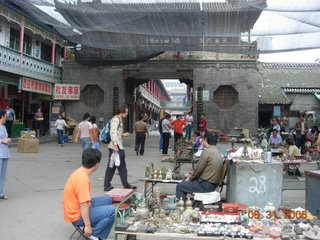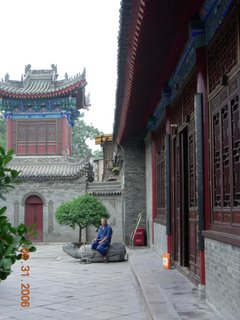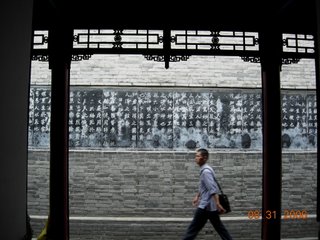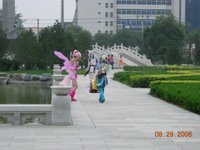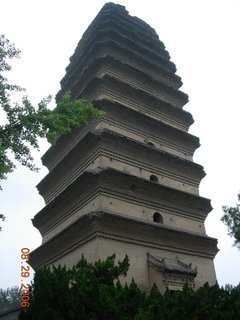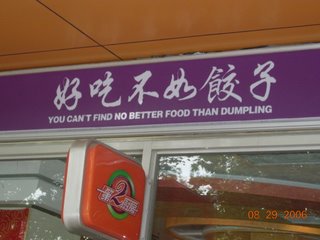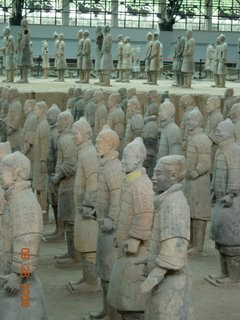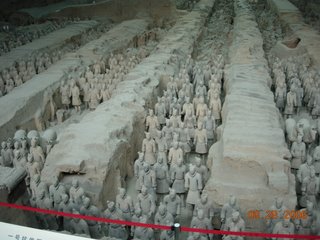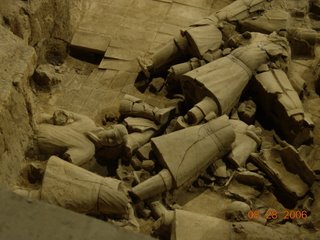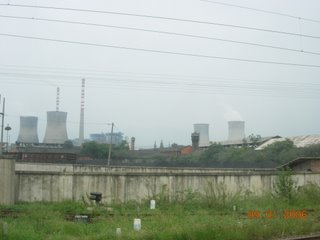Monday, October 23, 2006
Saturday, October 21, 2006
The low down on China
Two saxophones and an oboe played slow, sad songs in the park. The musicians were all retired and one man sitting near me of that same generation knew all the songs and sang the best parts of them. His scruffy dog got attention from all the kids who passed by. He asked me where I was from, and another guy joined us.
Just a little older than I, with short hair in the back with a long tuft in the front sticking straight out, came over and asked me the same question. He sat next to me, facing away, and without making eye contact he began to speak to me in impeccible English. He spoke quickly, almost nervously, and began to tell me a story.
His story began with how hard it is for people to find work in Xi'an. "There are no factories anywhere near the city center so there is very little opportunity. Wages are low, and government corruption is high. Without the welfare system, China would fall apart. Even I am on unemployment, these musicians are retired, that's why they can play here." Pointing to the old women in their simple, colorful clothes walking in close groups, he said "see them -- all these women are from the countryside."
In China, it's very hard to get a job. To get a good job, you have to have a masters degree, but even then, it's hard.
He went on to talk about Education in China. "Education in China is expensive. Parents have to pay for their schools, even primary school. Rich kids get spoiled - because of the One-Child policy; poor kids get left behind. In the countryside, it is particularly bad. You see, none of the kids who get an education will go back to the countryside to work. The wages are too low. Too low to live off of. So what winds up happening is older students teach thier younger piers instead of trained teachers. For the kids, all that matters are exams. They are always multiple choice. For English, kids may be able to choose the right answer, recognize nouns or verbs, but won't have any idea how to understand the language.
"When I pass my certification exams, I want to teach English. Or maybe I want to be the headmaster at a private school." All the headmaster does is make sure students attend class, and he will call the parents, or if the kids don't go out for morning exercises, he will make them go out. But, even headmasters do not earn good money. Now, what's happening is college students are offering tutoring in English for younger students.
"The young people here, they worship Western culture."
"Our economy is bad now. Too much political corruption. It used to be that politicians earned the same as the common people, and that led to corruption. Now, they will buy up land and sell contracts to develop it, then sell it for more money. They will buy up large pieces of land very, very cheap. Now they all have big fancy houses, their kids get the best education.
When someone buys a house in China, the land still belongs to the government. Your house will get a 70 year lease, after which, it is returned to the government. So if you buy a house on land leased sixty years ago, you don't know what wil happen to it after 10 years. The lease will expire, and you may not have any legal claim to it.
"In Mao's time, things were better. People had less, but everyone was satisfied. Now," pointing to the ladies from the countryside, "even the poor country people wear nicer clothes than the politicians then. Now, people have cell phones and they need things. In China, if I loan you money, or if the bank loans you money, you never return it. It just disappears."
Today, a teacher at a public school in Xi'an earns about 2000 Yuan a month. 20 years ago, it was less, maybe 100, but everybody earned 100 and people had enough. Today, our future is black. NObody knows what will happpen in china in the future.
Now, our president is better than the last one, but he cannot create change. He cannot fulfill his promises. Nobody knows what is going to happen to China. I don't know what we need to do.
"China is a peaceful country. We never attack other countries. Only small countries attack us. Vietnam, England, Portugal, Japan. That's why we need a big army: to defend against small countries. How does Portugal defeat China? Because we think Portugal is a big country, we listened and when they said give us money, we gave them silk adn backed down. That's why China is poor now. Small countries have always been taking from us. We're not like America, who is just invading small countrys, just attacking Iraq for oil."
Two saxophones and an oboe played slow, sad songs in the park. The musicians were all retired and one man sitting near me of that same generation knew all the songs and sang the best parts of them. His scruffy dog got attention from all the kids who passed by. He asked me where I was from, and another guy joined us.
Just a little older than I, with short hair in the back with a long tuft in the front sticking straight out, came over and asked me the same question. He sat next to me, facing away, and without making eye contact he began to speak to me in impeccible English. He spoke quickly, almost nervously, and began to tell me a story.
His story began with how hard it is for people to find work in Xi'an. "There are no factories anywhere near the city center so there is very little opportunity. Wages are low, and government corruption is high. Without the welfare system, China would fall apart. Even I am on unemployment, these musicians are retired, that's why they can play here." Pointing to the old women in their simple, colorful clothes walking in close groups, he said "see them -- all these women are from the countryside."
In China, it's very hard to get a job. To get a good job, you have to have a masters degree, but even then, it's hard.
He went on to talk about Education in China. "Education in China is expensive. Parents have to pay for their schools, even primary school. Rich kids get spoiled - because of the One-Child policy; poor kids get left behind. In the countryside, it is particularly bad. You see, none of the kids who get an education will go back to the countryside to work. The wages are too low. Too low to live off of. So what winds up happening is older students teach thier younger piers instead of trained teachers. For the kids, all that matters are exams. They are always multiple choice. For English, kids may be able to choose the right answer, recognize nouns or verbs, but won't have any idea how to understand the language.
"When I pass my certification exams, I want to teach English. Or maybe I want to be the headmaster at a private school." All the headmaster does is make sure students attend class, and he will call the parents, or if the kids don't go out for morning exercises, he will make them go out. But, even headmasters do not earn good money. Now, what's happening is college students are offering tutoring in English for younger students.
"The young people here, they worship Western culture."
"Our economy is bad now. Too much political corruption. It used to be that politicians earned the same as the common people, and that led to corruption. Now, they will buy up land and sell contracts to develop it, then sell it for more money. They will buy up large pieces of land very, very cheap. Now they all have big fancy houses, their kids get the best education.
When someone buys a house in China, the land still belongs to the government. Your house will get a 70 year lease, after which, it is returned to the government. So if you buy a house on land leased sixty years ago, you don't know what wil happen to it after 10 years. The lease will expire, and you may not have any legal claim to it.
"In Mao's time, things were better. People had less, but everyone was satisfied. Now," pointing to the ladies from the countryside, "even the poor country people wear nicer clothes than the politicians then. Now, people have cell phones and they need things. In China, if I loan you money, or if the bank loans you money, you never return it. It just disappears."
Today, a teacher at a public school in Xi'an earns about 2000 Yuan a month. 20 years ago, it was less, maybe 100, but everybody earned 100 and people had enough. Today, our future is black. NObody knows what will happpen in china in the future.
Now, our president is better than the last one, but he cannot create change. He cannot fulfill his promises. Nobody knows what is going to happen to China. I don't know what we need to do.
"China is a peaceful country. We never attack other countries. Only small countries attack us. Vietnam, England, Portugal, Japan. That's why we need a big army: to defend against small countries. How does Portugal defeat China? Because we think Portugal is a big country, we listened and when they said give us money, we gave them silk adn backed down. That's why China is poor now. Small countries have always been taking from us. We're not like America, who is just invading small countrys, just attacking Iraq for oil."
The Protectors of the Dead
Xi'an
-----
Xi'an is the center of ancient China, the beginning of the silk road, one of the world's most polluted cities, a busy modern city with lots of banks, brothels and heavy traffic. Xian marks the edge of the muslim world and the center of the Middle Kingdom. Here, there are more int'l brand name shops and more beggares and homeless than in the cities we've seen East of here.
Xi'an is a world-class city, older than Rome, doing all it can to prepare for the expected wave of tourists coming with the 2008 Olympics. Here, too, every shop is overstaffed adn nobody trusts you to be able to choose what you like in a shop without help.
Tonight, we went into a crowded restaurant, but couldn't read the menu. Aja wrote chicken and vegetables and 5o Yuan ($6) in Japanese and we were brought a feast! The best food we've had yet. The Chinese food you find in China doesn't tend to resemble too closely the Chinese food served in the West. Everything is deep fried to death, and we are warned not to eat anything fresh because the water it's washed in could be too toxic for our soft stomachs. Yet as we move away from the sea, the food improves. In China, the mountain food is much better.
--------------------------------------------------------
A short bus ride from the city are the tombs of the first Qin emperror, who first united Central China by conquering the neighboring countries. He began construction of the Great Wall, and employed an army of 700,000 people to build an army of clay men to guard him in an underground city and palace after his death. This grand project was then buried under five meters of earth. Today, he is the hero who united China, but he was so unpopular that soon after he died, his tomb's army was sacked, burned and forgotten.
Under massive roofs, the Qin army has been unearthed and reconstructed. Seeing these people captured in clay, made with such care and skill, and each with his own personality showing through their clay skin, it is living people you see. Most of these men were larger than contemporary Chinese people and myself. (Perhaps Qin dynasty people had a better diet?) They all had different expressions, although no one's face or movements were exaggerated at all. They were all calm, not posing, but silently waiting, standing guard.
Standing in their presence, I felt as if I had entered a very holy place. This was the first shrine I've been to where I truly felt that a soul was enshrined, embodied in the space and in each statue. When the tomb was being excavated, one body was found in perfect condition, with peaches still fresh and words written on Bamboo leaves and preserved in water. When these things were discovered and exposed to air, the peaches turned to water before they could be photographed, the body dried up, and the calligraphy on the Bamboo leaves disappeared as the leaves turned black and curled up when removed from the water. The archaeologists mush have broken a powerful spell when they entered with their cameras and fresh air.
The relics of the underground palace are safe, for now. We don't yet know how to build a building big enough to cover that large an area nor do we have the technology to pump out the aquifer that the city lies under.
The tombs with the warriors were discovered in the 70's when some farmers digging a well found a statue. They were frightened. They thought they had unearthed a god and made it angry. But they quickly became folk heroes adn received state visits and got in newspapers as archaeologists discovered what a treasure they had found. They were not the first to dig up a statue, though. One of them told of his grandpa who dug one up in 1911 while digging a well. This statue stood until the well went dry. The farmers thought the warrior had drunken all the water and was smashed to bits. This has happened many times over history, but it was not until globalization and the 70's when finding a buried statue triggered a national wave of excitement.
Xi'an
-----
Xi'an is the center of ancient China, the beginning of the silk road, one of the world's most polluted cities, a busy modern city with lots of banks, brothels and heavy traffic. Xian marks the edge of the muslim world and the center of the Middle Kingdom. Here, there are more int'l brand name shops and more beggares and homeless than in the cities we've seen East of here.
Xi'an is a world-class city, older than Rome, doing all it can to prepare for the expected wave of tourists coming with the 2008 Olympics. Here, too, every shop is overstaffed adn nobody trusts you to be able to choose what you like in a shop without help.
Tonight, we went into a crowded restaurant, but couldn't read the menu. Aja wrote chicken and vegetables and 5o Yuan ($6) in Japanese and we were brought a feast! The best food we've had yet. The Chinese food you find in China doesn't tend to resemble too closely the Chinese food served in the West. Everything is deep fried to death, and we are warned not to eat anything fresh because the water it's washed in could be too toxic for our soft stomachs. Yet as we move away from the sea, the food improves. In China, the mountain food is much better.
--------------------------------------------------------
A short bus ride from the city are the tombs of the first Qin emperror, who first united Central China by conquering the neighboring countries. He began construction of the Great Wall, and employed an army of 700,000 people to build an army of clay men to guard him in an underground city and palace after his death. This grand project was then buried under five meters of earth. Today, he is the hero who united China, but he was so unpopular that soon after he died, his tomb's army was sacked, burned and forgotten.
Under massive roofs, the Qin army has been unearthed and reconstructed. Seeing these people captured in clay, made with such care and skill, and each with his own personality showing through their clay skin, it is living people you see. Most of these men were larger than contemporary Chinese people and myself. (Perhaps Qin dynasty people had a better diet?) They all had different expressions, although no one's face or movements were exaggerated at all. They were all calm, not posing, but silently waiting, standing guard.
Standing in their presence, I felt as if I had entered a very holy place. This was the first shrine I've been to where I truly felt that a soul was enshrined, embodied in the space and in each statue. When the tomb was being excavated, one body was found in perfect condition, with peaches still fresh and words written on Bamboo leaves and preserved in water. When these things were discovered and exposed to air, the peaches turned to water before they could be photographed, the body dried up, and the calligraphy on the Bamboo leaves disappeared as the leaves turned black and curled up when removed from the water. The archaeologists mush have broken a powerful spell when they entered with their cameras and fresh air.
The relics of the underground palace are safe, for now. We don't yet know how to build a building big enough to cover that large an area nor do we have the technology to pump out the aquifer that the city lies under.
The tombs with the warriors were discovered in the 70's when some farmers digging a well found a statue. They were frightened. They thought they had unearthed a god and made it angry. But they quickly became folk heroes adn received state visits and got in newspapers as archaeologists discovered what a treasure they had found. They were not the first to dig up a statue, though. One of them told of his grandpa who dug one up in 1911 while digging a well. This statue stood until the well went dry. The farmers thought the warrior had drunken all the water and was smashed to bits. This has happened many times over history, but it was not until globalization and the 70's when finding a buried statue triggered a national wave of excitement.
Wednesday, October 18, 2006
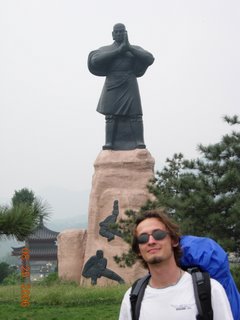
Shaolin Temple August 24
Shaolin sits nestled between steep mountains in a place the Taoists consider the center of the world. There are thousands of Kung Fu students wearing differen uniforms representing the many local schools. They practice their moves in the temple ground's many courtyards and open spaces. The mountains come and go behind clouds of mist. Barely a trickle flows through the canalized river full of plants in front of Shaolin Temple and the ground above it is dry and cracked. The monks, or perhaps it is the other people who live here -- people who run hotels or old ladies who collect plastic bottles--have patches of corn, chilies and other crops growin on the hills, barely kept separate from the wild vegetation.
In the morning and evening, the traffic shifts from being that of tourists to the rusty, clunky tractor-wagons that the farmers and workers drive. On hills, even motorcycles turn off their engines and cruise slowly with squeaky brakes and rarely with only a single passenger. When we arrived in Dengfeng, shaolin's supporting city, we were immediately harangued by a crowd of men waving Shaolin flyers and who shout Hello at any foreigner. One who spoke only the English required to give a repetitive speech about how he would give us a ride and that Shaolin is 17km from Dengfeng and that there were no busses and no places to stay inside Shaolin so we should go to a hotel he knows attached himself to us until we agreed to take his ride. A thoroughly obnoxious man whose lie about there being no busses we believed after asking a bus station worker who carelessly answered our questions with no, no, no. Or driver didn't want to take us to the temple. He insisted it was too late in the day to see the temple and that if we bought tickets, we would not have time and we would not find a place to stay, and we really should go with him to a hotel he knows. If he hadn't been so annoying, we may have taken his advice.
We didn't worry about finding a place to stay. Wearing our large backpacks, we stood out as people who hadn't yet found a hotel and we became the target of, first one, then two, three, four, and finally five ladies waving hotel business cards at us and refusing to go away. Every time they felt they had lost our attention, they shouted a crisp "hello" at us. We wanted them to leave, we wanted to look around and go to them when we wanted their services. I tried to write to them using the Japanese Kanji I know, which got them excited and they began writing to me in Chinese instead of shouting. Aja ran away to some Italian guys to ask them where they were staying so we could rid ourselves of the pack of ladies who were firmly latched on to us. They gave us the business card of the hotel, and when we showed it to the ladies to show that we had made up our minds and didn't need them, they reached into their purses and pulled out the same business card. We ate an ice cream, and set off.
To get to the hotel, we had to buy tickets and go inside the temple grounds. The most aggressive of ladies following us was stopped at the ticket gate. She tried to run around it, but was stopped again. The Italians and we went down a slope and waited for a van to pick us up. Just before we got in, not one, but two of the haggling ladies had evaded security and were running towards us. They got to the van, but were shoed away by the driver because there was no room. They didn't stop them. They pushed the Italians over and one sat on the other's lap. We laughed and laughed from the back seat. At this point, they served no purpose, but hoped desperately to receive a commission.
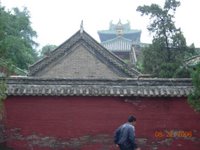

Our hotel is in a tall cement building painted to look like a grey brick building. The women working here are quite curious and nosy about everything we do. One young girl who works here wants to be our friend, and tries to teach us Chinese. Other times, she just sits close and smiles.
Shaolin temple is a large walled complex with tall pagodas that are freshly painted with bright colors under the eaves. There are big golden statues of Buddahs and past Kung Fu masters with wild expressions carved on their faces. There is a courtyard full of stelae, and one ofthem, under an ancient Gingko treeis from Courtney's master in Albuquerque.
Next to the temple is an area with older, unrestored buildings, dirt roads and piles of rubble. In this area, we went in a brick building with a plastic roof and dirt floor that smelled like earth worms to watch a performance. The performers pushed their bodies to do almost superhuman things. One person tied himself in a knot and twisted around like a rubber toy. Another became a monkey and climbed to the top of a pole he was carrying. They sped across the stage, movingflimsy and rattling weapons in all directions as fast as lightning. A drunken master flailed across the stage with a controlled sword.
We caught a few stories behind some of the buildings by placing ourselves with a passing tour group of Spaniards and Aja translated for me:
The Pagoda got its name because Damo refused to take any students, saying he would teach when it snows red. One determined monk decided one snowy day to chop off h is arm and ask for teaching. To remember this act of self-sacrifice, this shrine was built.
I assume the one armed monk became Damo's disciple, but the guide didn't mention it.
Trying to escape from another commission-seeking salesman of sorts, who attached himself to us at our hotel and followed us saying "hello, hello" and pointing to places we didn't want to go, we slipped into the first temple we passed. We had to show our tickets, so he couldn't follow us.
In this temple, we were first greeted by a huge Buddha, and then went to a winding system of dimly lit corridors filled with the most interesting statues. They were people from all over the world made out of shiny glazed clay and in the dim light, they almost came alive. They were all doing different things. Some were meditating, some doing Kung Fu. They had thoughtful, sleepy, angry and joyful expressions. One frightened looking statue stood with one foot on a tiger.
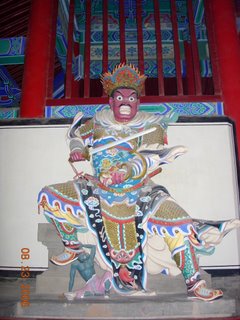
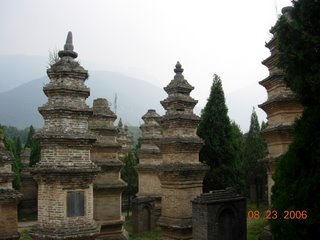
Pagoda forest in Shaolin
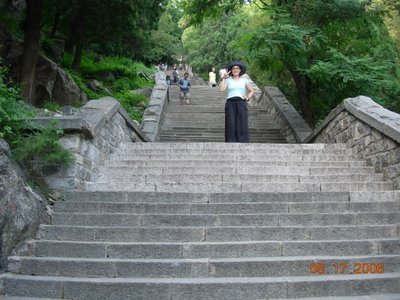
Tai Shan
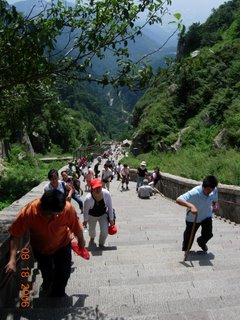
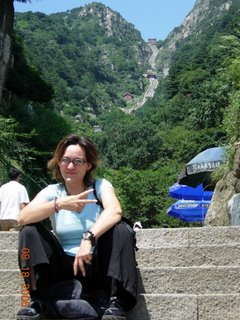
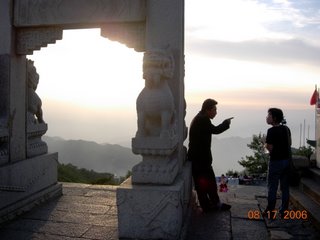
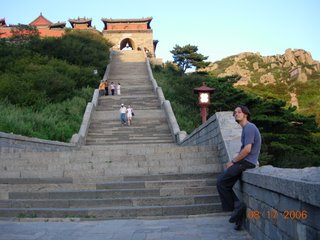
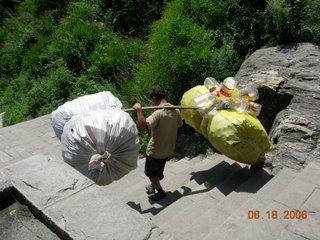
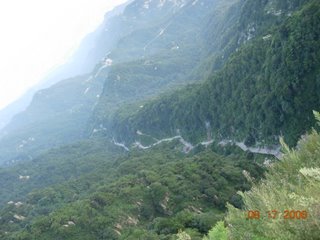
.
Tai Shan is a sacred Taoist mountain and the most climbed mountain on earth. It has been climbed by many past emperrors, and when Mao climbed it and watched the sun rise, he exclaimed "the East is red". On top is a huge temple complex, a range of hotels, and a host of vendors selling the same things as the vendors in the city. A cool wind blows, and the air is finally clear enough to see that the sky is blue above. From here, through a haze, the city of Tai An is visible and even it has a pair of cooling towers. The horizon in every direction, just below the top of the mountain is defined by a dark brown line of smog. It covers everything, not only the city, but the mountains on the other side of the mountain as far as you can see. A clear day below the smog never has a clear blue sky, it is always like looking up with sunglasses on.
The staircase up Tai Shan is an impressive raised stone staircase almost the entire way up. The path is on such a grand scale, that it would certainly make the Great Wall slightly less impressive. The way is lined with gates, temples and vendors. The temples have stone or brick walls with dark red plastered walls and colorfully painted tile roofs with clay animals walking out on the upturned corners. Inside are the statues of the gods of Tai Shan, and people make prayers by lighting incense sticks as thick as my arm and locking locks to the incense altar that slowly get covered in ash.
